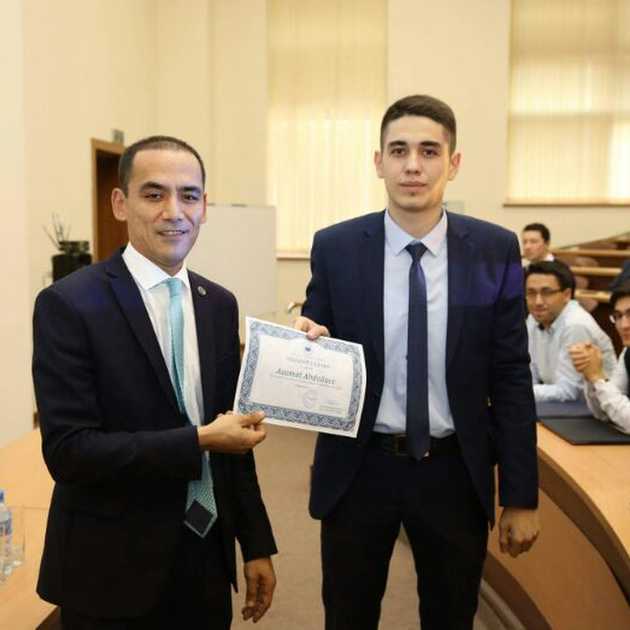This is Part 1 of 3 in a series of articles detailing my journey to Amazon.
Intro
I’ve been working at Amazon Web Services (AWS) since September 2022 — for almost three years now, but I recently realized I’ve never shared the story of how I got here. I hope some of you will find this useful.
This is a long journey, to make it easier to grasp, I decided to split this into 3 Parts.
Background
I was born into a family deeply rooted in mathematics—my father, Utkir Rozikov, is a world-renowned mathematical scientist and an academician of both The World Academy of Sciences and the Academy of Sciences of the Republic of Uzbekistan.
Me and my younger brother, Laziz Abdullaev, who is now pursuing a PhD in AI at the National University of Singapore grew up with mathematics. From a very young age, we sat next to our father, asked questions, and filled notebooks with solved problems—starting as early as age 3.
When asked a question:
What do you want to be when you grow up?
My answer had always been:
A mathematical scientist just like my father!
Education
Pre-university & Entrance
Driven by this dream, I focused on Mathematics, Physics, and English—the three subjects required to pass the entrance exams for the mathematics faculty at the National University of Uzbekistan. In 2014 (when I was 16), the year I began preparing for entrance exams, Inha University in Tashkent was established—one of the very few international universities in Uzbekistan at the time. I opened their website to learn about the taught specialties, and that was the first time I saw the terms programming and IT—and learned that they were among the coolest things in the modern world. Most importantly, both universities required the same set of subjects for their entrance exams, which meant I could apply to both without changing my preparation. Additionally, my goal was to study for free—wherever I got in—by earning a full scholarship. The goal was set clearly, and I knew I had three challenging years of preparation ahead, as these were among the most competitive universities in the country.
Three years flew by 🕊. It was the summer of 2017—entrance exam season in Uzbekistan, and everything I had worked for was about to be put to the test. At the last day of application submissions, the candidate stats and quotas were:
| University | Faculty | Candidates | Scholarship Quota | Competition per place |
|---|---|---|---|---|
| National University of Uzbekistan | Mathematics | ~300 | 15 | ~20 candidates |
| Inha University in Tashkent | Computer Science and Engineering | ~1000 | 10 | ~100 candidates |
Seeing the numbers, I realized the competition was far tougher than I had expected—especially at Inha University in Tashkent, where around 100 candidates were competing for each scholarship spot.
…1 week: 2 exams.
The exam results were published one after another. Fortunately, the 3-year preparation driven by the clear goal had paid off 🎉. I was:
- accepted to the National University of Uzbekistan with a full scholarship, ranked #1 among all applicants ✅
- one of the 10 candidates who was accepted with full scholarship to Inha University in Tashkent ✅
After careful consideration, I chose to attend Inha University in Tashkent to become a programmer—even though, at the time, I didn’t fully understand what that truly meant.
University
Day 1 at the at Inha University in Tashkent: was grateful for everything I had been blessed with 🤲 and excited for what lay ahead, I felt ready to take on a new challenge: to become a good programmer.
On Day 1, I also met Makhmudjon Inadullaev: with whom we together learned programming, stayed after classes in the evenings to share new knowledge with each other. A few weeks later, Saidakbar Makhmudkhujaev joined our little learning circle, turning it into a group of three. We learned C++, Java and JavaScript together. That group still exists to this day—and we’ve become more than just study partners; we’re lifelong friends now.
For every team project that involved coding, we were always excited by the opportunity—often staying late to build something great and striving to be the best team. We also took part in hackathons & coding challenges to find that project building opportunity, and to look for expert feedback.
Academic excellence
I was also among the top academic performers, graduating with a Grade Point Average (GPA) of 4.40 out of 4.50—roughly 98%—over four years, ranking in the top 2% of my class. While there were subjects I studied primarily to earn a good grade, I took many of them seriously with a long-term mindset: Calculus, Discrete Mathematics, Probability & Statistics, Linear Algebra, Data Structures & Algorithms, Object-Oriented Programming, Systems Programming, Operating Systems, and others.
With the foundation laid, it was time to move from notebooks and classrooms to real-world systems, production code, and solving problems at scale. That’s where the Part 2 of my journey begins. Stay tuned and see you in Part 2 🤝


